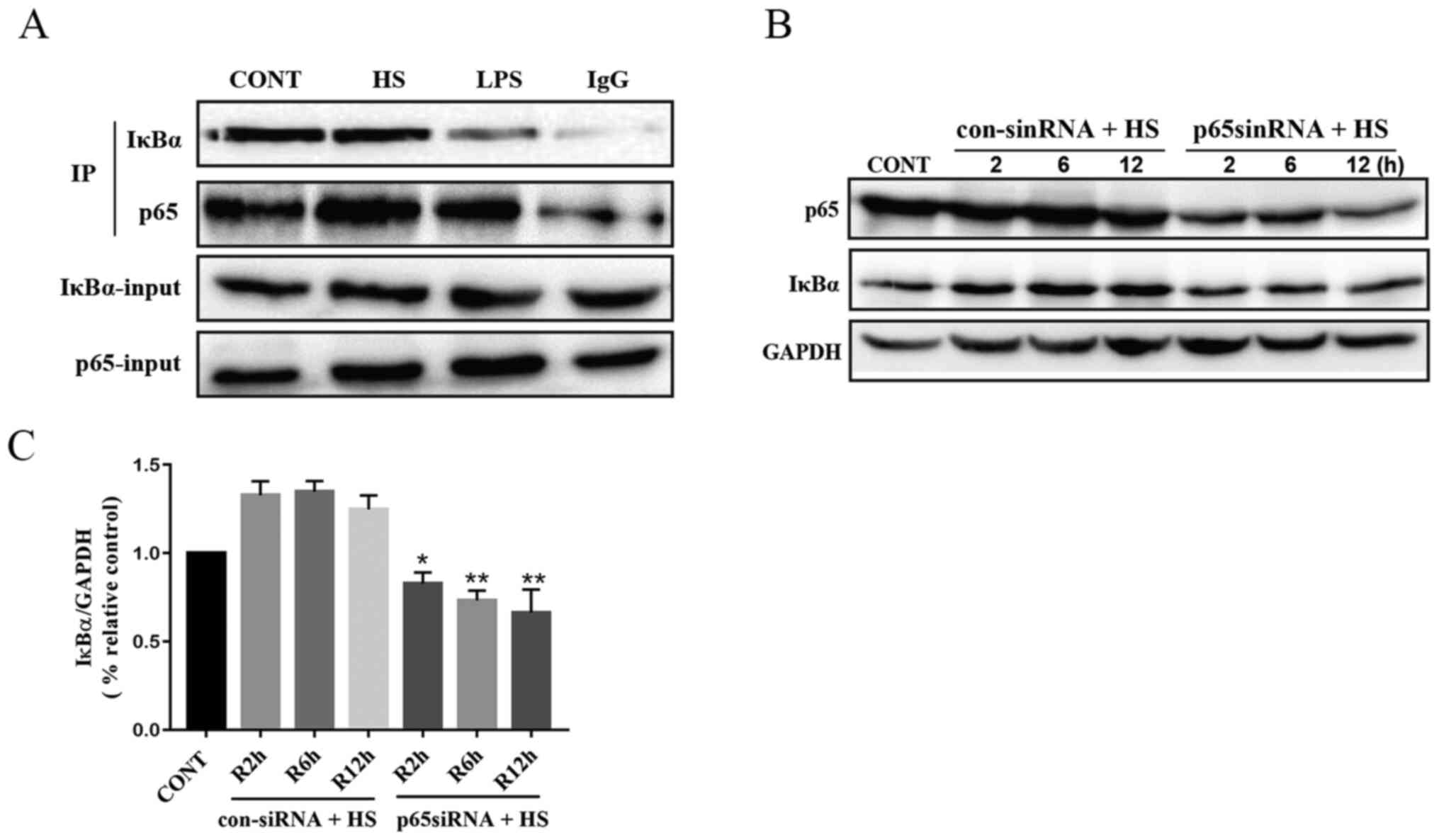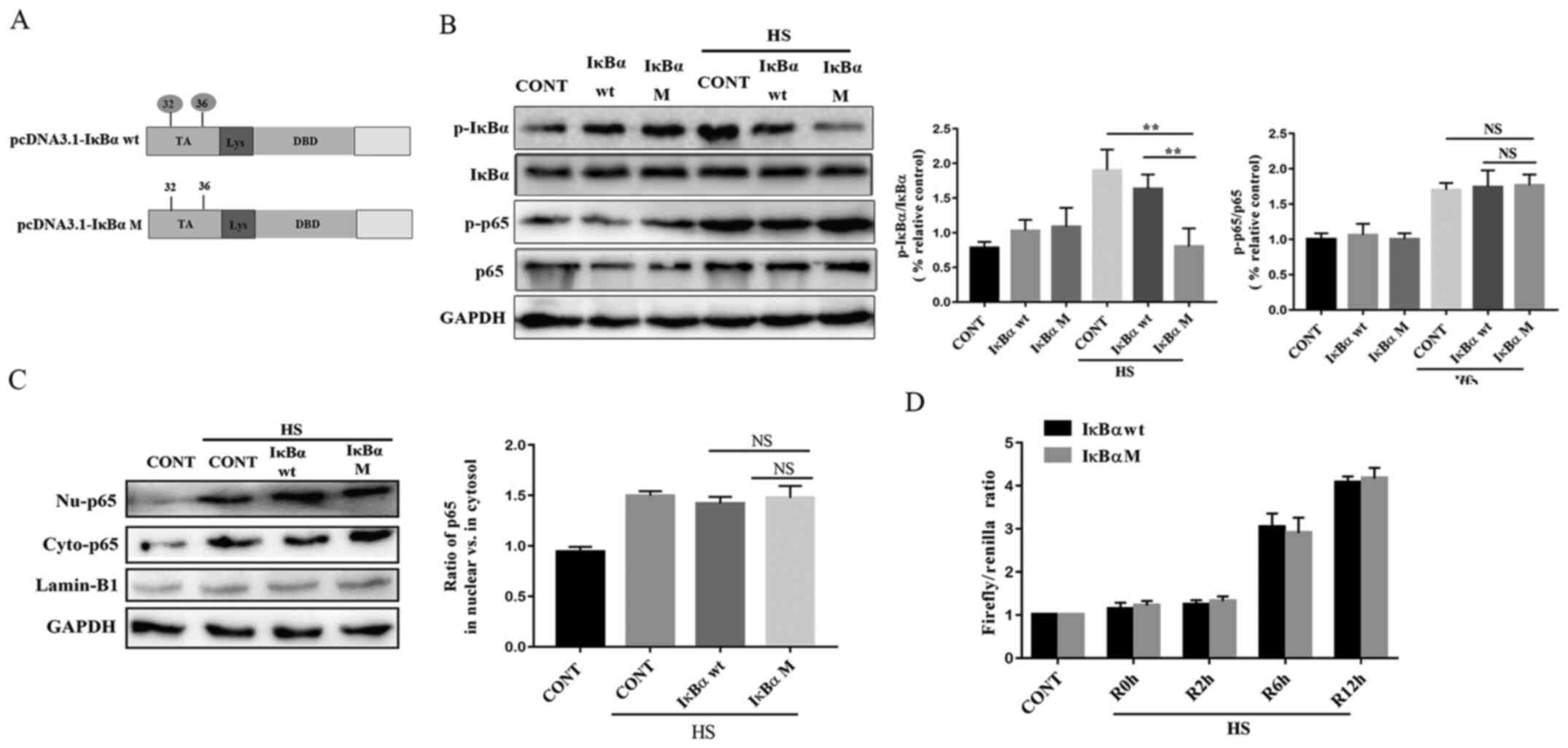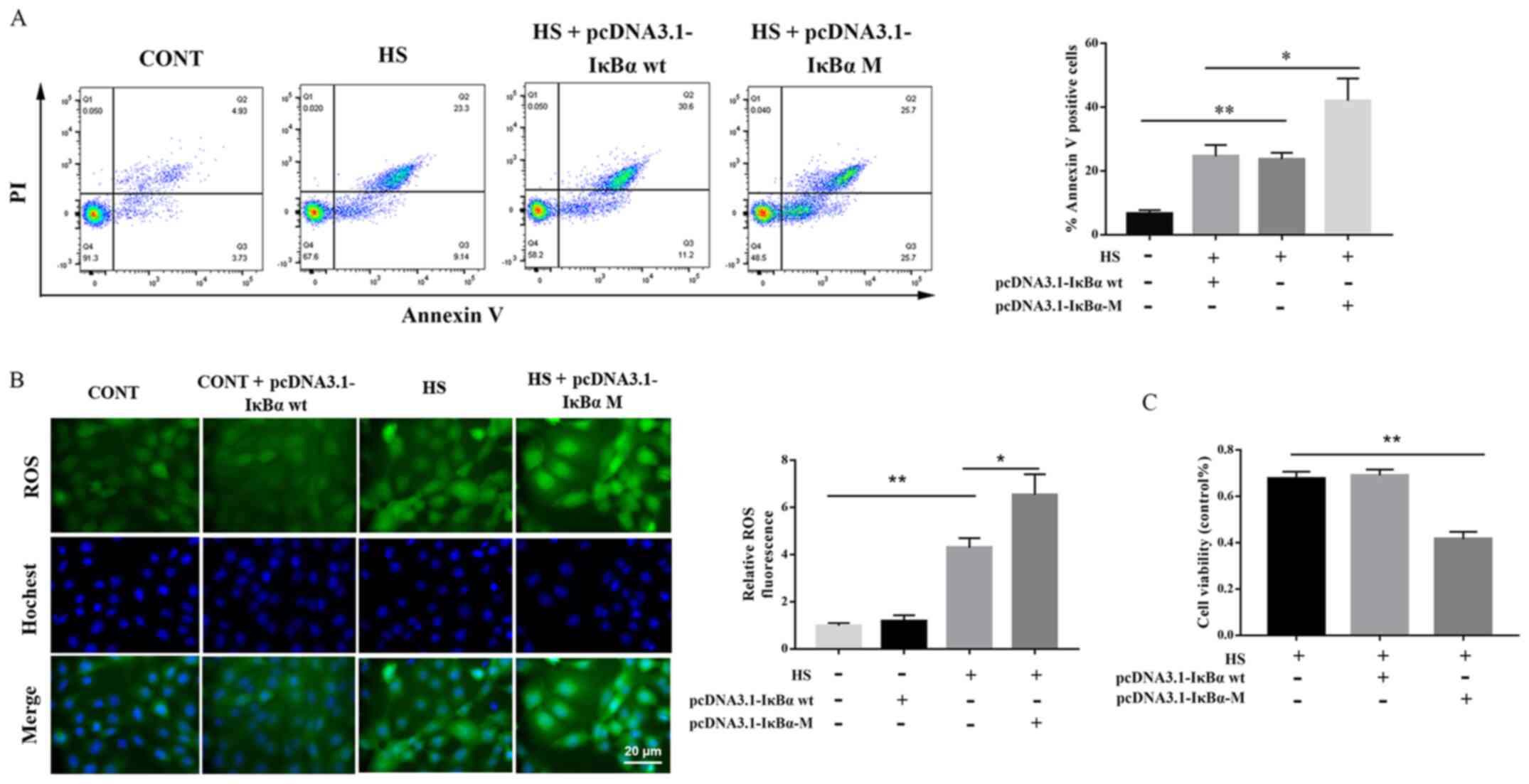|
1
|
Bouchama A and Knochel JP: Heat stroke. N
Engl J Med. 346:1978–1988. 2002. View Article : Google Scholar : PubMed/NCBI
|
|
2
|
Lin C-H, Tsai C-C, Chen T-H, Chang C-P and
Yang H-H: Oxytocin maintains lung histological and functional
integrity to confer protection in heat stroke. Sci Rep.
9:183902019. View Article : Google Scholar : PubMed/NCBI
|
|
3
|
Yang Y, Li C, Liu N, Wang M, Zhou X, Kim
IH and Wu Z: Ursolic acid alleviates heat stress-induced lung
injury by regulating endoplasmic reticulum stress signaling in
mice. J Nutr Biochem. 89:1085572021. View Article : Google Scholar : PubMed/NCBI
|
|
4
|
Li L, Tan H, Gu Z, Liu Z, Geng Y, Liu Y,
Tong H, Tang Y, Qiu J and Su L: Heat stress induces apoptosis
through a Ca2+-mediated mitochondrial apoptotic pathway
in human umbilical vein endothelial cells. PLoS One. 9:e1110832014.
View Article : Google Scholar : PubMed/NCBI
|
|
5
|
Rodriguez-Fernandez M, Grosman B,
Yuraszeck TM, Helwig BG, Leon LR and Doyle FJ III: Modeling the
intra- and extracellular cytokine signaling pathway under heat
stroke in the liver. PLoS One. 8:e733932013. View Article : Google Scholar : PubMed/NCBI
|
|
6
|
Zhang L, Li Y, Xing D and Gao C:
Characterization of mitochondrial dynamics and subcellular
localization of ROS reveal that HsfA2 alleviates oxidative damage
caused by heat stress in Arabidopsis. J Exp Bot. 60:2073–2091.
2009. View Article : Google Scholar : PubMed/NCBI
|
|
7
|
Das M, Solanki A, Ganesh A and Thakore S:
Emerging hybrid biomaterials for oxidative stress induced
photodynamic therapy. Photodiagnosis Photodyn Ther. 34:1022592021.
View Article : Google Scholar : PubMed/NCBI
|
|
8
|
Sharma A, Tewari D, Nabavi SF, Nabavi SM
and Habtemariam S: Reactive oxygen species modulators in pulmonary
medicine. Curr Opin Pharmacol. 57:157–164. 2021. View Article : Google Scholar : PubMed/NCBI
|
|
9
|
Liu Y, Zhou G, Wang Z, Guo X, Xu Q, Huang
Q and Su L: NF-κB signaling is essential for resistance to heat
stress-induced early stage apoptosis in human umbilical vein
endothelial cells. Sci Rep. 5:135472015. View Article : Google Scholar : PubMed/NCBI
|
|
10
|
Kostyuk SV, Porokhovnik LN, Ershova ES,
Malinovskaya EM, Konkova MS, Kameneva LV, Dolgikh OA, Veiko VP,
Pisarev VM, Martynov AV, et al: Changes of KEAP1/NRF2 and IKB/NF-κB
Expression Levels Induced by Cell-Free DNA in Different Cell Types.
Oxid Med Cell Longev. 2018:10524132018. View Article : Google Scholar : PubMed/NCBI
|
|
11
|
Lalle G, Twardowski J and Grinberg-Bleyer
Y: NF-κB in Cancer Immunity: Friend or Foe? Cells. 10:3552021.
View Article : Google Scholar : PubMed/NCBI
|
|
12
|
Zhao H, Wang Y, Liu Y, Yin K, Wang D, Li
B, Yu H and Xing M: ROS-Induced Hepatotoxicity under Cypermethrin:
Involvement of the Crosstalk between Nrf2/Keap1 and NF-κB/iκB-α
Pathways Regulated by Proteasome. Environ Sci Technol.
55:6171–6183. 2021. View Article : Google Scholar : PubMed/NCBI
|
|
13
|
Shen H, Ji Y, Xiong Y, Kim H, Zhong X, Jin
MG, Shah YM, Omary MB, Liu Y, Qi L, et al: Medullary thymic
epithelial NF-κB-inducing kinase (NIK)/IKKα pathway shapes
autoimmunity and liver and lung homeostasis in mice. Proc Natl Acad
Sci USA. 116:19090–19097. 2019. View Article : Google Scholar : PubMed/NCBI
|
|
14
|
Shen J, Cheng J, Zhu S, Zhao J, Ye Q, Xu
Y, Dong H and Zheng X: Regulating effect of baicalin on
IKK/IKB/NF-κB signaling pathway and apoptosis-related proteins in
rats with ulcerative colitis. Int Immunopharmacol. 73:193–200.
2019. View Article : Google Scholar : PubMed/NCBI
|
|
15
|
Liang W-J, Yang H-W, Liu H-N, Qian W and
Chen X-L: HMGB1 upregulates NF-κB by inhibiting IKB-α and
associates with diabetic retinopathy. Life Sci. 241:1171462020.
View Article : Google Scholar : PubMed/NCBI
|
|
16
|
Nelson DE, Ihekwaba AE, Elliott M, Johnson
JR, Gibney CA, Foreman BE, Nelson G, See V, Horton CA, Spiller DG,
et al: Oscillations in NF-kappaB signaling control the dynamics of
gene expression. Science. 306:704–708. 2004. View Article : Google Scholar : PubMed/NCBI
|
|
17
|
Amaro-Leal Â, Shvachiy L, Pinto R,
Geraldes V, Rocha I and Mota-Filipe H: Therapeutic effects of IkB
kinase inhibitor during systemic inflammation. Int Immunopharmacol.
84:1065092020. View Article : Google Scholar : PubMed/NCBI
|
|
18
|
Fordjour FA, Asiedu E, Larbi A and
Kwarteng A: The role of nuclear factor kappa B (NF-κB) in filarial
pathology. J Cell Commun Signal. 15:185–193. 2021. View Article : Google Scholar : PubMed/NCBI
|
|
19
|
Huang W, Xie W, Gong J, Wang W, Cai S,
Huang Q, Chen Z and Liu Y: Heat stress induces RIP1/RIP3-dependent
necroptosis through the MAPK, NF-κB, and c-Jun signaling pathways
in pulmonary vascular endothelial cells. Biochem Biophys Res
Commun. 528:206–212. 2020. View Article : Google Scholar : PubMed/NCBI
|
|
20
|
Zhang H, Ji J, Liu Q and Xu S: MUC1
downregulation promotes TNF-α-induced necroptosis in human
bronchial epithelial cells via regulation of the RIPK1/RIPK3
pathway. J Cell Physiol. 234:15080–15088. 2019. View Article : Google Scholar : PubMed/NCBI
|
|
21
|
Li L, Tan H, Zou Z, Gong J, Zhou J, Peng
N, Su L, Maegele M, Cai D and Gu Z: Preventing necroptosis by
scavenging ROS production alleviates heat stress-induced intestinal
injury. Int J Hyperthermia. 37:517–530. 2020. View Article : Google Scholar : PubMed/NCBI
|
|
22
|
Huang Z, Wu SQ, Liang Y, Zhou X, Chen W,
Li L, Wu J, Zhuang Q, Chen C, Li J, et al: RIP1/RIP3 binding to
HSV-1 ICP6 initiates necroptosis to restrict virus propagation in
mice. Cell Host Microbe. 17:229–242. 2015. View Article : Google Scholar : PubMed/NCBI
|
|
23
|
Peng D, Li J, Deng Y, Zhu X, Zhao L, Zhang
Y, Li Z, Ou S, Li S and Jiang Y: Sodium para-aminosalicylic acid
inhibits manganese-induced NLRP3 inflammasome-dependent pyroptosis
by inhibiting NF-κB pathway activation and oxidative stress. J
Neuroinflammation. 17:3432020. View Article : Google Scholar : PubMed/NCBI
|
|
24
|
Epstein Y and Yanovich R: Heatstroke. N
Engl J Med. 380:2449–2459. 2019. View Article : Google Scholar : PubMed/NCBI
|
|
25
|
Dokladny K, Myers OB and Moseley PL: Heat
shock response and autophagy - cooperation and control. Autophagy.
11:200–213. 2015. View Article : Google Scholar : PubMed/NCBI
|
|
26
|
Li L, Su Z, Zou Z, Tan H, Cai D, Su L and
Gu Z: Ser46 phosphorylation of p53 is an essential event in
prolyl-isomerase Pin1-mediated p53-independent apoptosis in
response to heat stress. Cell Death Dis. 10:962019. View Article : Google Scholar : PubMed/NCBI
|
|
27
|
Liu ZF, Zheng D, Fan GC, Peng T and Su L:
Heat stress prevents lipopolysaccharide-induced apoptosis in
pulmonary microvascular endothelial cells by blocking calpain/p38
MAPK signalling. Apoptosis. 21:896–904. 2016. View Article : Google Scholar : PubMed/NCBI
|
|
28
|
Gu ZT, Wang H, Li L, Liu YS, Deng XB, Huo
SF, Yuan FF, Liu ZF, Tong HS and Su L: Heat stress induces
apoptosis through transcription-independent p53-mediated
mitochondrial pathways in human umbilical vein endothelial cell.
Sci Rep. 4:44692014. View Article : Google Scholar : PubMed/NCBI
|
|
29
|
Yu J, Liu F, Yin P, Zhao H, Luan W, Hou X,
Zhong Y, Jia D, Zan J, Ma W, et al: Involvement of oxidative stress
and mitogen-activated protein kinase signaling pathways in heat
stress-induced injury in the rat small intestine. Stress.
16:99–113. 2013. View Article : Google Scholar : PubMed/NCBI
|
|
30
|
Hop HT, Arayan LT, Reyes AWB, Huy TXN, Min
WG, Lee HJ, Rhee MH, Chang HH and Kim S: Heat-stress-modulated
induction of NF-κB leads to brucellacidal pro-inflammatory defense
against Brucella abortus infection in murine macrophages and
in a mouse model. BMC Microbiol. 18:442018. View Article : Google Scholar : PubMed/NCBI
|
|
31
|
Rasmi RR, Sakthivel KM and Guruvayoorappan
C: NF-κB inhibitors in treatment and prevention of lung cancer.
Biomed Pharmacother. 1105692020. View Article : Google Scholar : PubMed/NCBI
|
|
32
|
Hellweg CE: The Nuclear Factor κB pathway:
A link to the immune system in the radiation response. Cancer Lett.
368:275–289. 2015. View Article : Google Scholar : PubMed/NCBI
|
|
33
|
Kawai T and Akira S: Signaling to
NF-kappaB by Toll-like receptors. Trends Mol Med. 13:460–469. 2007.
View Article : Google Scholar : PubMed/NCBI
|
|
34
|
Alharbi KS, Fuloria NK, Fuloria S, Rahman
SB, Al-Malki WH, Javed Shaikh MA, Thangavelu L, Singh SK, Rama Raju
Allam VS, Jha NK, et al: Nuclear factor-kappa B and its role in
inflammatory lung disease. Chem Biol Interact. 345:1095682021.
View Article : Google Scholar : PubMed/NCBI
|
|
35
|
Cai J, Guan H, Jiao X, Yang J, Chen X,
Zhang H, Zheng Y, Zhu Y, Liu Q and Zhang Z: NLRP3 inflammasome
mediated pyroptosis is involved in cadmium exposure-induced
neuroinflammation through the IL-1β/IkB-α-NF-κB-NLRP3 feedback loop
in swine. Toxicology. 453:1527202021. View Article : Google Scholar : PubMed/NCBI
|


















